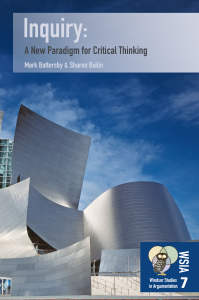Inquiry: A New Paradigm for Critical Thinking
Synopsis
This volume reflects the development and theoretical foundation of a new paradigm for critical thinking based on inquiry. The field of critical thinking, as manifested in the Informal Logic movement, developed primarily as a response to the inadequacies of formalism to represent actual argumentative practice and to provide useful argumentative skills to students. Because of this, the primary focus of the field has been on informal arguments rather than formal reasoning. Yet the formalist history of the field is still evident in its emphasis, with respect to both theory and pedagogy, on the structure and evaluation of individual, de-contextualized arguments. It is our view that such a view of critical thinking is excessively narrow and limited, failing to provide an understanding of argumentation as largely a matter of comparative evaluation of a variety of contending positions and arguments with the goal of reaching a reasoned judgment on an issue. As a consequence, traditional critical thinking instruction is problematic in failing to provide the reasoning skills that students need in order to accomplish this goal. Instead, the goal of critical thinking instruction has been seen largely as a defensive one: of learning to not fall prey to invalid, inadequate, or fallacious arguments.
The cover image for this volume is available from the United States Library of Congress's Prints and Photographs division under the digital ID pplot.13725. It is part of the public domain and is available here.
Chapters
-
Critical Thinking as Applied EpistemologyRelocating Critical Thinking in the Philosophical Landscape
-
Argumentation as Inquiry
-
The Problem with Percy: Epistemology, Understanding, and Critical Thinking
-
Reason Appreciation
-
Inquiry: A Dialectical Approach to Teaching Critical Thinking
-
Guidelines for Reaching a Reasoned Judgment
-
Conductive Argumentation, Degrees of Confidence, and the Communication of Uncertainty
-
Assessing Expert Claims: Critical Thinking and the Appeal to Authority
-
Fallacy Identification in a Dialectical Approach to Teaching Critical Thinking
-
Critical Inquiry: Considering the Context
-
Critical Thinking and Cognitive Biases
-
DAMed If You Do; DAMed If You Don’t: Cohen’s “Missed Opportunities”
-
Beyond the Boundaries: The Epistemological Significance of Differing Cultural Perspectives
-
Teaching Critical Inquiry in Science: The Role of Dialectical Context in Scientific Reasoning
-
Applied Epistemology and Argumentation in Epidemiology
-
The Competent Layperson: Re-envisioning the Ideal of the Educated Person
-
Critical Thinking as Inquiry in Higher Education
-
Fostering the Virtues of Inquiry
-
Is Argument for Conservatives? or Where Do Sparkling New Ideas Come From
-
Enhancing Rationality: Heuristics, Biases, and The Critical Thinking Project



